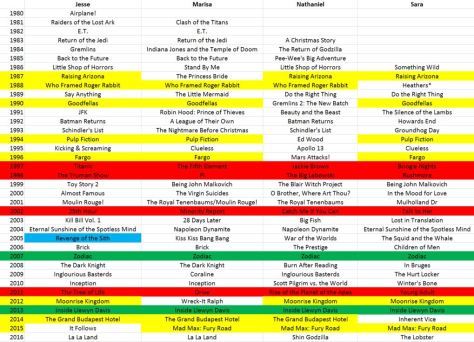Jesse is a cofounder of SportsAlcohol.com even though he doesn't care for sports or alcohol. His favorite movie is Ron Howard's The Paper. I think. This is what happens when you don't write your own bio. I know for sure likes pie.
I don’t mean to be glib when I say that this year’s Tribeca is, like some Tribecas of the past, pretty big on women-fucking-up indie movies. I’m actually pretty excited to say that, because women-fucking-up indies tend to be a lot more fresh and a lot less mopey than their male counterparts, the latter tending to be awash with sensitive acoustic guitar music, passivity, beards, and Manic Pixie Dream Girls.
There actually might be a Manic Pixie Dream Girl of sorts in Duck Butter (Grade: C-), or maybe she’s a commentary on one; it’s hard to tell, because the movie is so low-key unpleasant. Sergio (Laia Costa) meets Naima (Alia Shawkat, who co-wrote the film with director Miguel Arteta) in between Naima’s first day on the set of an indie movie and the next day, when she is told she’s been fired; Sergio is first seen singing in public in a way that’s not very good but supposed to be bold and charming (not a good sign) and makes a post-hookup proposal that Naima initially rejects, then warms to after her firing: Why don’t they spend a full 24 hours together, having sex every hour or so, as a way of jumpstarting their intimacy and honesty?

Why not? Well, mostly because it’s exhausting, even with a 93-minute running time. Sergio acts vaguely mercurial (which is to say petulant), Naima acts vaguely overcautious (which is to say normal), and rather than a fuller understanding of their characters, you mostly get an idea of what kind of thought-experiment noodling Shawkat and Arteta would like to see from the movies they watch. Credit due, though: Duck Butter (which opens today in limited release and hits VOD next week) is the first movie where I’ve seen both Duplass Brothers playing themselves, and the awkwardness of their interactions with Naima feel more like vintage (if second-tier) Arteta.
Naima is an actress who is too self-conscious about the shitty state of the world to appear especially creative. Two more Tribeca movies focus on women who use their creativity to fight their crummy circumstances, not so much women-fucking-up movies (though one sort of takes the form of one) as women-fucking-shit-up movies. The documentary Love, Gilda (Grade: B-) chronicles the life of peerless SNL player Gilda Radner, who died far too soon at the age of 42, from ovarian cancer. The film, assembled from old photos, home movies, and diaries (though it’s hard to tell when the latter are fudged together with the audio book of her autobiography, It’s Always Something), is a moving and candid portrait, though the materials it’s working with sometimes feel stretched thin, cinematically speaking (some of the shots of old photos linger too long, as if the movie has nothing else to cut to for the moment). It’s not a wildly insightful movie, but it’s valuable both for getting to hear Radner’s voice again (in the voiceover audio as well as her comic voice in various clips, some oft-repeated SNL bits and some more obscure), and to see Amy Poehler, Melissa McCarthy, Maya Rudolph, and Bill Hader read through her diaries and reflect on her comic technique (Poehler calls most of her SNL characters poor Radner imitations, a humble way of acknowledging her hero’s influence).
The talking-heads from people who actually knew Radner are a little thin. Lorne Michaels, Chevy Chase, and Laraine Newman go on camera, but it’s disappointing not to hear from Dan Aykroyd, Jane Curtin, or (less surprising, but even so) Bill Murray. What resonates most about the movie is Radner’s joy of performance – that despite her eating disorder or neediness, she truly and, especially toward the end, unselfishly, loved making people laugh.
It wouldn’t be fair to compare the tough and fictional stand-up comedian of All About Nina (Grade: C+) to Gilda Radner, but as well-observed as the movie’s fake stand-up routines are, it could have used a little more sense of that joy, however fleeting. Nina (Mary Elizabeth Winstead) is a brash, smart lady comic with a dark past who gets a long-awaited shot at an SNL-style show (based for plot convenience in Los Angeles rather than Nina’s native New York). The pacing of the movie, as Nina breaks things off with an abusive boyfriend, moves to L.A., temporarily rooms with her agent’s new-age-y friend, and strikes up a romance with a plainspoken guy outside the entertainment industry (Common), is careful and appealingly slow. But the movie’s turn into Nina’s tragic backstory, while right up to the minute with the #MeToo movement, isn’t handled as adroitly, and even makes the movie’s first hour feel poky and rambling in retrospect. It’s too bad, because Winstead is typically great as Nina; she has a great scene running through some material three-quarters naked in front of her apartment window, invigorated by her own talent. In the end, though, All About Nina feels ambivalent about the very act of making comedy; it wants to position it as Nina’s salvation, of sorts, but at arm’s length, like it secretly finds the whole thing kind of distasteful, a remove the movie never fully explores.

Karen Gillan’s The Party’s Just Beginning (Grade: B-) is more of a traditional young-lady-fucking-up movie, about a Scottish gal (Gillan) flailing through a drunken, French-fry-binging, casual-sex-having life after the suicide of her best friend. As written, the material is pretty boilerplate, but Gillan shows a lot of promise behind the camera. In front of it, she captures the desperate helplessness that can come with grief. Even when she’s spiraling, the movie never mopes—or breaks out the sensitive acoustic guitar.














